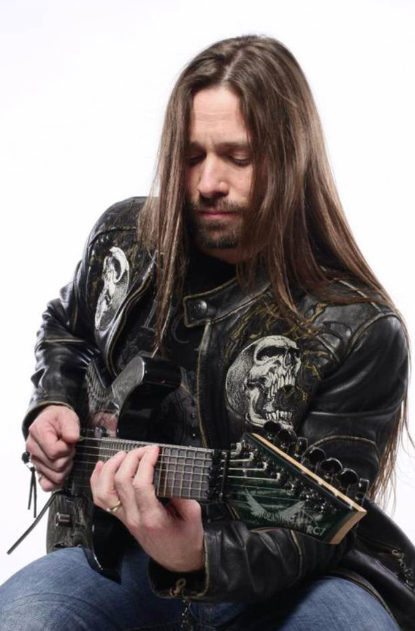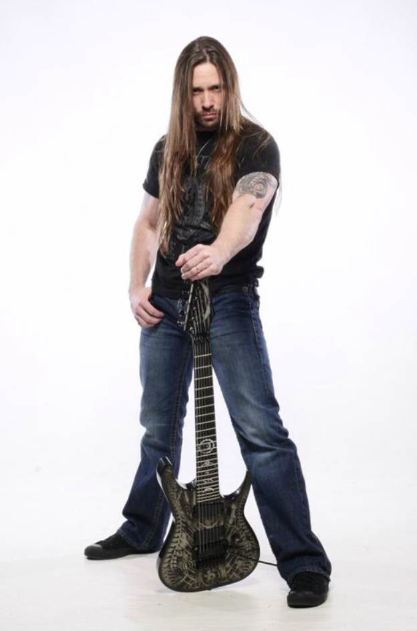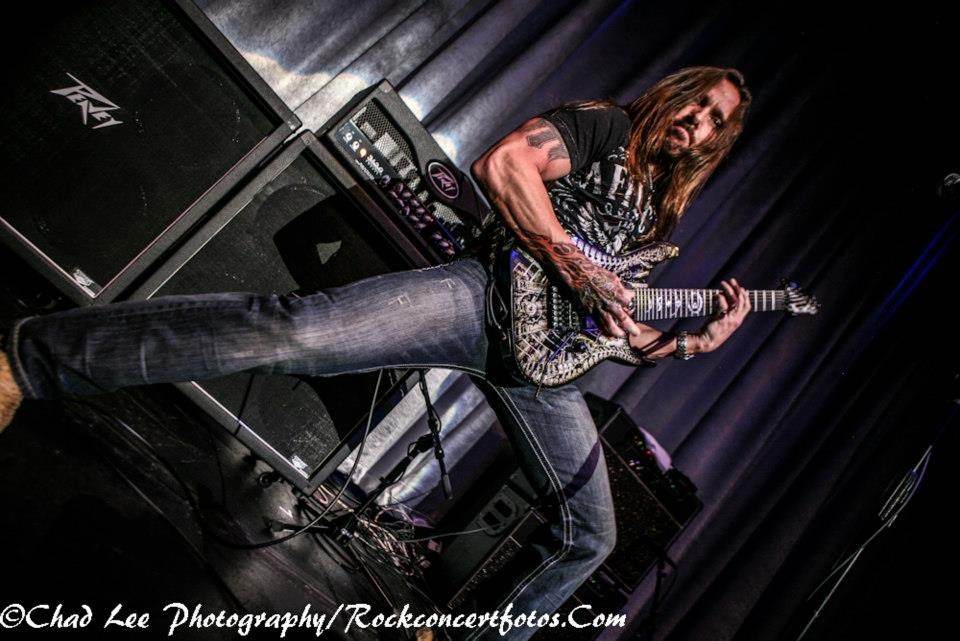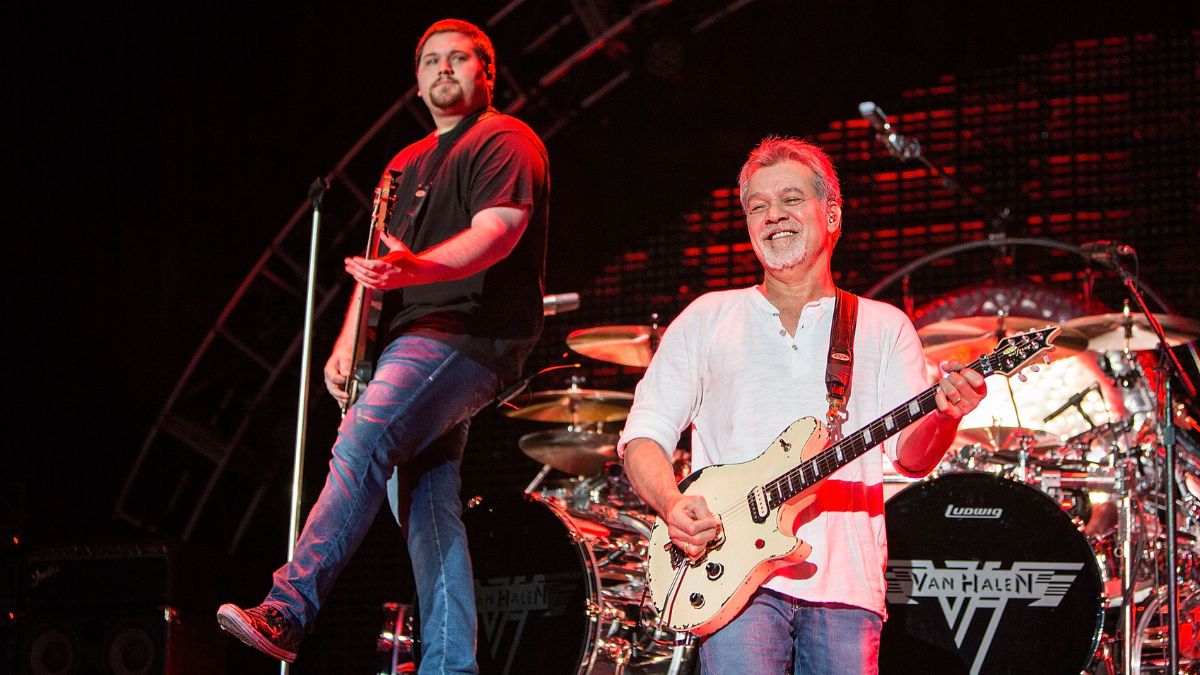Interview: Shredder Rusty Cooley Talks Guitar Instruction, Signature Dean Guitars and His Approach to Soloing
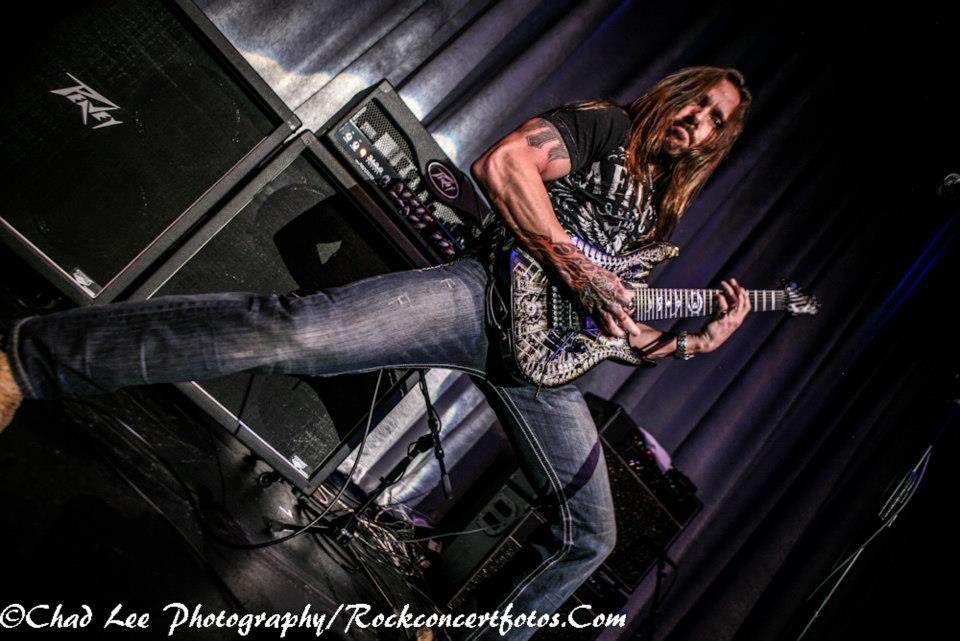
Rusty Cooley is a shred guitar legend.
Cooley, a premier guitar instructor, has played on records by All Shall Perish, Austrian Death Machine and many more and has had a serious influence on a generation of young players.
Cooley appears on Michael Angelo Batio’s new album, Intermezzo (on the song “8 Pillars of Steel”), and Cooley's new band, Day Of Reckoning, has released a single — with a new album on the way.
We recently checked in with Cooley to discuss Day Of Reckoning, his Dean guitars, gear in general and a lot more.
GUITAR WORLD: Day of Reckoning's new single, "Left to Follow," is ultra-heavy. What gear did you use? And what can you tell me about the upcoming album?
For amps, I used a Splawn Nitro, Bogner Uberschall and a Peavey 6505+. For guitars, I had a couple of my signature Dean RC7s loaded with an EMG 85-7 in the bridge and a 707 in the neck. I also used an Axe FX II, Morley Tremonti wah, some Diamond cabs and a Maxon OD808. Hopefully, the CD will be out by May, if not earlier. We're just waiting on final mixes. People can check out the single at our site.
Let's discuss your new signature Dual overdrive pedal by EC Pedals and your signature strings by SIT. What makes them different?
All the latest guitar news, interviews, lessons, reviews, deals and more, direct to your inbox!
The new pedal has two twin overdrive channels so I can have a different setting for rhythm and lead with the push of only one button. The pedal only has two buttons; one is an on/off and the other toggles between the overdrive stages. For example, if the pedal is off, one of the overdrive channels will be on standby, as indicated by a red or blue LED. When you engage the pedal, that channel kicks on and then whenever you want the other option you hit one button to change.
By designing the pedal this way, I'm eliminating one more button to push. That might not seem like a lot, but if you're going from a rhythm to a lead and you need to turn something else on or off, it can start to be a lot to do while still shredding and not missing a beat or a change.
The signature set of strings from SIT is going to be the exact string gauges I use on my seven-string guitars, which is .09 to 042 and then a .060 for the low B. All of my Dean models will come stock with these strings.
Speaking of your Dean seven- and eight-string signature models, what affect do they have on your playing?
These guitars are like the Lamborghini of seven- and eight-string guitars, built for speed and performance with killer versatile tone. They’re suitable for just about any style. The import model won the Gold Award from Guitar World in, I think, 2012; and that's one of the things they mentioned, that it was versatile enough for jazz or country. You might get some funny looks showing up to a jazz or country gig with one of these, but the tone speaks for itself.
They have the thinnest necks with the tallest frets so that when you are playing, it's your fingers against the string and the string against the fret, so your fingers are not really hitting the fretboard. At first it can be a challenge if you are used to putting the death grip on everything because you'll be fretting everything too hard and making your guitar go sharp.
In the long run, you develop much greater dynamics and control. It also sports the deepest and widest cutaway on the market, giving you more access to the highest frets and giving you ability the to stretch as much as you want without the body or upper horn getting in your way.
It has one volume knob and no tone knob. Mine was on 10 always so I figured why bother with it? The guitar comes loaded with two EMG 707's, and soon we're going to release some other options like the 66 and 57 and even some single coils.
Why more strings? It simply gives you more range and opens the doors to new and exciting territory. The sevens are high E to low B. There are two different eights. One is high E to low F#; the second one is high A to low B for maximum shredding, creativity and originality.
In 2013 you played on the new Falling In Reverse CD with Jacky Vincent. In fact, you've also appeared on many albums, including releases by All Shall Perish, After The Burial, etc. How do you approach your solos on tracks like this? How do you tend to compose in general?
I haven't composed a solo in a long time. I usually improvise all of it. Just go in and go for it. Sometimes I won’t even listen to the track before I go in the studio. The Falling In Reverse stuff — they couldn’t even let me hear it, so I flew to Florida and got there and listened to the track and heard what Jacky had already done, so I knew what not to do and what to try to add to make it stand apart.
Let's talk about your book with accompanying CDs by Rock House Method, Fretboard Autopsy. Why would you recommend them to other players?
Fretboard visualization is something to be taken very seriously if what you seek is total fretboard control. With fretboard visualization, you see all of the notes on the fretboard light up in your mind's eye like tiny LEDs. When you can see this, you're on your way to musical freedom. When you can see the neck as a whole, it has many benefits, like seeing chordal possibilities and arpeggio possibilities and more choices for creative leads.
So Fretboard Autopsy is reverse engineering the fretboard. I take you step by step through all of the patterns I have used throughout the years to gain fretboard visualization. Truefire just released a great program from me called Rusty Cooley’s Lickopedia: Licks, Techniques & Concepts for the Modern Guitarist. I highly recommend it!
You have been on more than eight instructional DVDs. What has teaching done for your playing?
It has given me a much greater understanding of the instrument and how to communicate with others. It's funny. I've written some of my coolest stuff while teaching, because I'll need a way to show a certain idea, and boom, that's where creativity and inspiration hits. I think it's because I'm not at home trying to write for myself; it's because I’m trying to get an idea across that the metal gods shine down and present me with these gifts!
Honestly, I don't know where half of the stuff comes from. I pick up the guitar and it just flows. Also because of teaching I have met some of the greatest people. People I would have never been exposed to otherwise, everyone from other musicians to leading doctors, lawyers, judges, professional athletes, you name it. Bryan Johnson from Mallrats is on a TV show called Comic Book Men on AMC. He asked me for one of my signature T-shirts to wear on the last season. How cool is that?
For more about Cooley, visit rustycooley.com.
Dave Reffett is a hard rock and metal guitarist and lover of all genres of music. He's a Berklee College of Music grad and has played with Guthrie Govan, Jeff Loomis, Michael Romeo, Mike Mangini, George Lynch, Michael Angelo Batio, Chris Poland, Glen Drover, Glen Sobel, Derek St. Holmes, Michael Devin, Rusty Cooley, Craig Goldy, Joe Stump, Annie Grunwald and many others. He is a guitar and bass instructor at the Real School of Music in Boston and works with Dangerous Guitar. He produced The Call of the Flames, which Bruce Dickinson of Iron Maiden called "a must-have album." He played a major hand in Batio's new album, Intermezzo, played on the album's single, "8 Pillars of Steel," and wrote and produced "Juggernaut." Dave is an endorsee for Seymour Duncan, Mogami, Eminence, Kahler and Legator. He has worked at Sanctuary Records and Virgin Records/EMI Music, promoting acts including the Rolling Stones, Korn, Iron Maiden and Meat Loaf. Dave has taught his licks and ideas to people across the globe.
